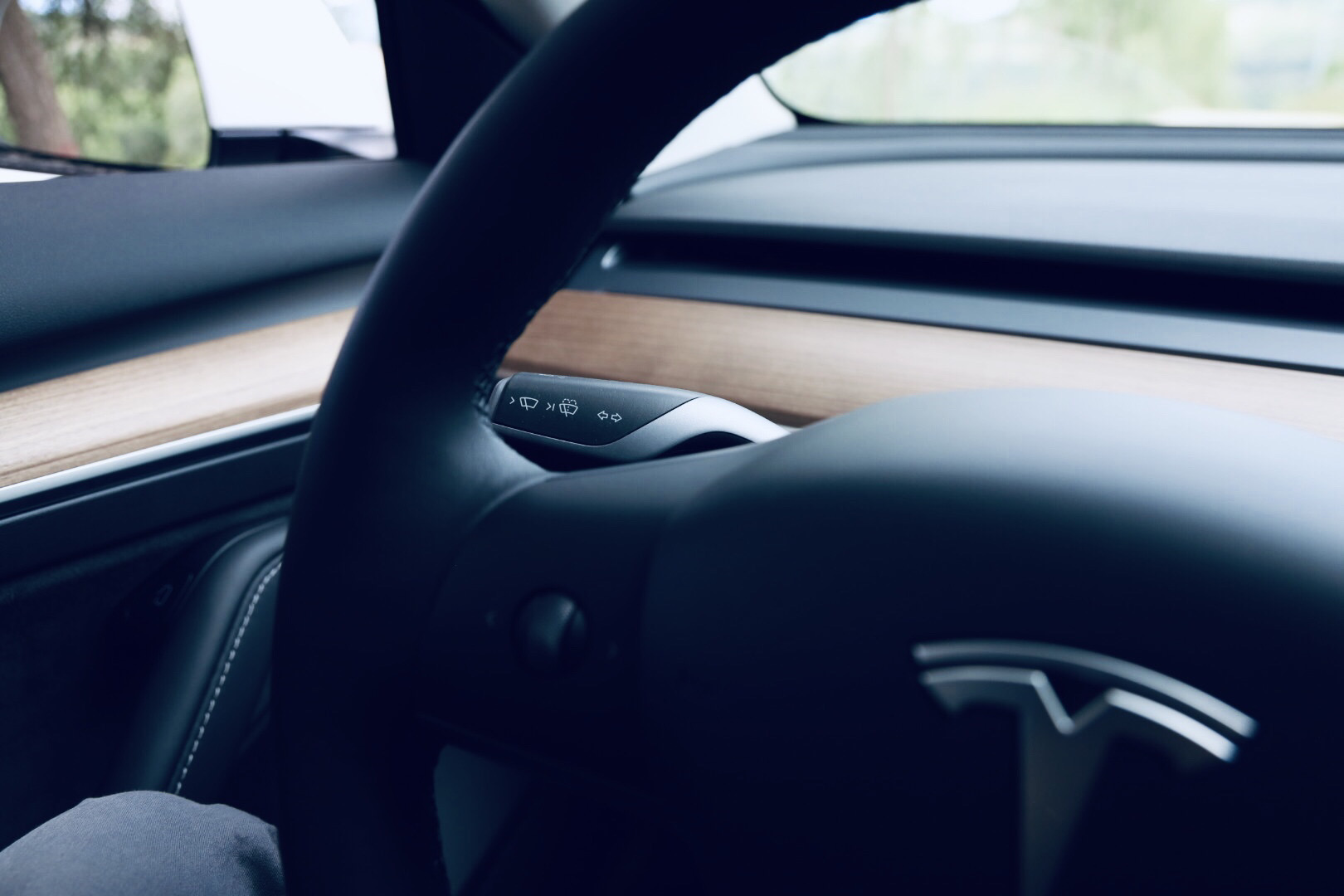
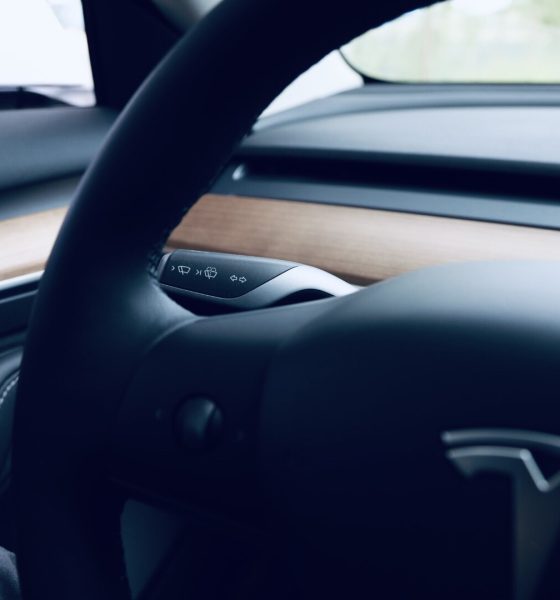
News
Mozilla Foundation dubs Tesla, Nissan, and fellow modern cars a “privacy nightmare”
A report published by the Mozilla Foundation has claimed that cars are the “worst category of products for privacy” that the firm has ever reviewed. As noted by Mozilla, out of 25 car brands that it studied, none made the cut. Tesla, arguably the most software-focused carmaker today, was singled out by the firm for its “untrustworthy AI.”
Mozilla noted that automakers today, if one were to closely look at their privacy policies, collect a lot of data. The firm noted that every single one of the 25 car brands that it studied collected more personal data than necessary. Around 84% of the carmakers also share or sell customer data, and 92% give drivers little to no control over their personal data.
Specifically, Mozilla studied Renault, Dacia, BMW, Subaru, Fiat, Jeep, Chrysler, Dodge, Volkswagen, Toyota, Lexus, Ford, Lincoln, Audi, Mercedes-Benz, Honda, Acura, Kia, Chevrolet, Buick, GMC, Cadillac, Hyundai, Nissan, and Tesla. Among these, Mozilla called out Tesla and Nissan for data privacy policies that are reportedly alarming.
As noted by Mozilla, Tesla is actually not too bad when it comes to its privacy policies. The company, for one, does not sell or rent personal information to third parties. Tesla also gives owners the choice of whether they wish to share their personal information with third parties or not. Mozilla, however, took issue with Tesla’s warning that customers who opt out of vehicle connectivity could have a car that’s unusable.
“If you no longer wish for us to collect vehicle data or any other data from your Tesla vehicle, please contact us to deactivate connectivity. Please note, certain advanced features such as over-the-air updates, remote services, and interactivity with mobile applications, and in-car features such as location search, Internet radio, voice commands, and web browser functionality rely on such connectivity.
“If you choose to opt out of vehicle data collection (with the exception of in-car Data Sharing preferences), we will not be able to know or notify you of issues applicable to your vehicle in real time. This may result in your vehicle suffering from reduced functionality, serious damage, or inoperability,” Tesla’s privacy notice read.
Nissan, for its part, is reportedly worse, Mozilla noted. The firm noted that in the Nissan USA privacy notice, the automaker makes references to some strange policies. In the “Types of Personal Data collected” section of the page, for one, Nissan noted that things such as “citizenship status, immigration status, race, national origin, religious or philosophical beliefs, sexual orientation, sexual activity, and genetic information” are collected.
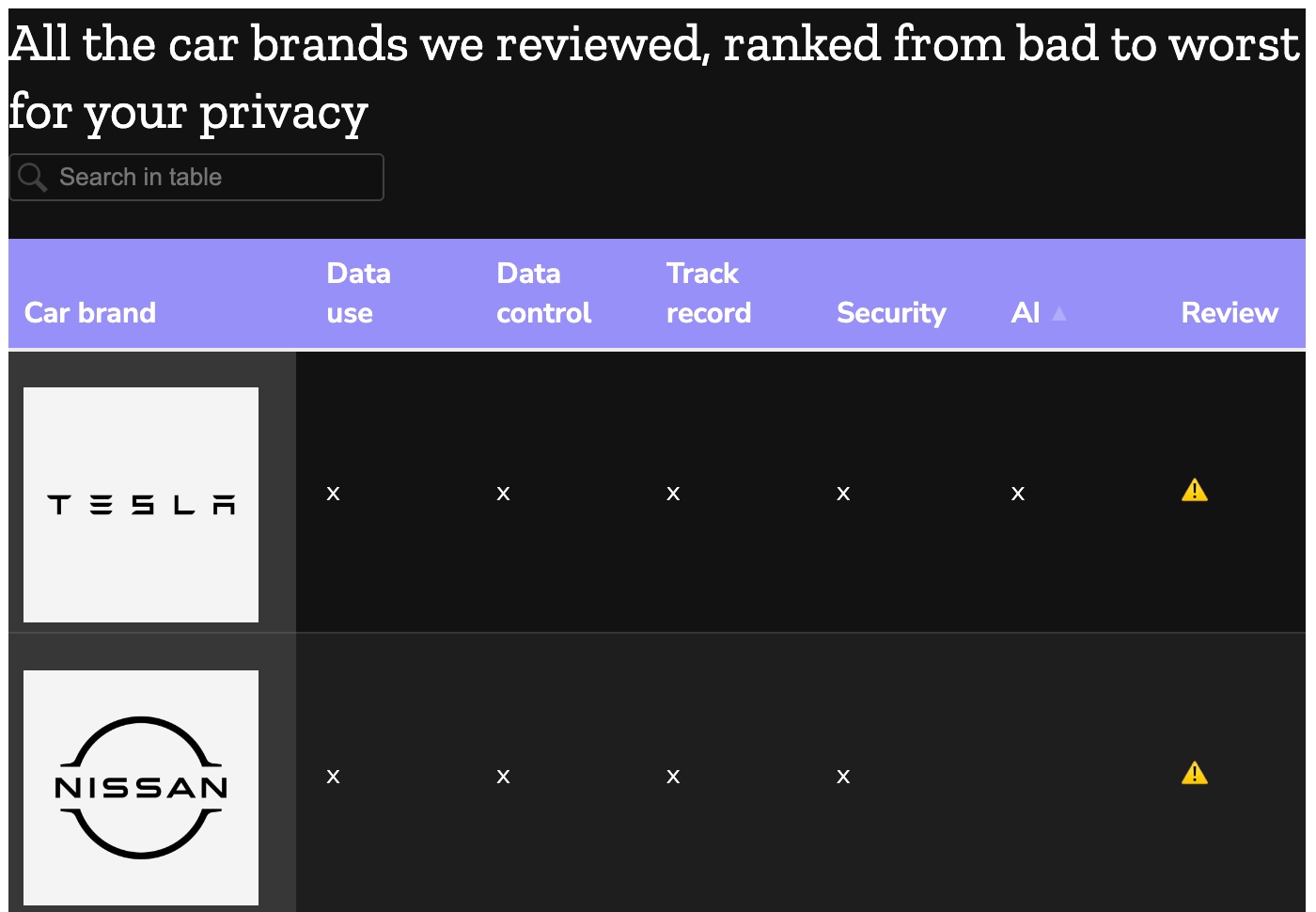
Nissan also noted that the company could share and sell “inferences drawn from any Personal Data collected to create a profile about a consumer reflecting the consumer’s preferences, characteristics, psychological trends, predispositions, behavior, attitudes, intelligence, abilities, and aptitudes” to other parties for targeted marketing purposes.
“Nissan earned its second-to-last spot for collecting some of the creepiest categories of data we have ever seen. It’s worth reading the review in full, but you should know it includes your ‘sexual activity.’ Not to be outdone, Kia also mentions they can collect information about your ‘sex life’ in their privacy policy. Oh, and six car companies say they can collect your ‘genetic information’ or ‘genetic characteristics.’ Yes, reading car privacy policies is a scary endeavor,” the Mozilla Foundation noted.
The Mozilla Foundation noted that Nissan is probably the worst car company that it has reviewed with regards to privacy. However, in the firm’s rankings, it opted to put Tesla at the bottom of the list, below Nissan. This, according to Mozilla, was because Tesla also received marks for having “untrustworthy AI,” which is connected to Autopilot.
“Tesla is only the second product we have ever reviewed to receive all of our privacy ‘dings.’ (The first was an AI chatbot we reviewed earlier this year.) What set them apart was earning the ‘untrustworthy AI’ ding. The brand’s AI-powered Autopilot was reportedly involved in 17 deaths and 736 crashes and is currently the subject of multiple government investigations,” the foundation noted.
Don’t hesitate to contact us with news tips. Just send a message to simon@teslarati.com to give us a heads-up.

Elon Musk
Celebrating SpaceX’s Falcon Heavy Tesla Roadster launch, seven years later (Op-Ed)
Seven years later, the question is no longer “What if this works?” It’s “How far does this go?”
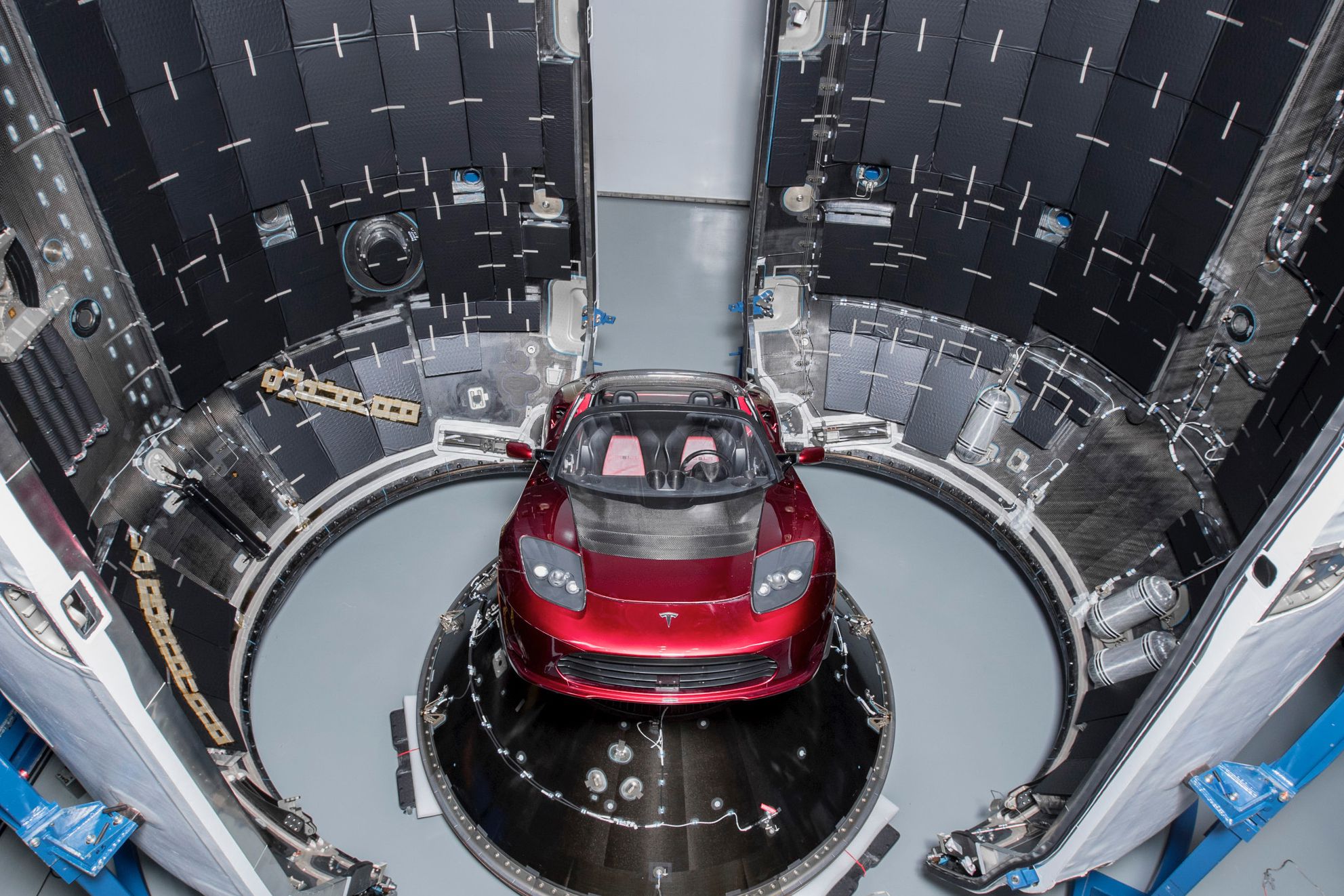
When Falcon Heavy lifted off in February 2018 with Elon Musk’s personal Tesla Roadster as its payload, SpaceX was at a much different place. So was Tesla. It was unclear whether Falcon Heavy was feasible at all, and Tesla was in the depths of Model 3 production hell.
At the time, Tesla’s market capitalization hovered around $55–60 billion, an amount critics argued was already grossly overvalued. SpaceX, on the other hand, was an aggressive private launch provider known for taking risks that traditional aerospace companies avoided.
The Roadster launch was bold by design. Falcon Heavy’s maiden mission carried no paying payload, no government satellite, just a car drifting past Earth with David Bowie playing in the background. To many, it looked like a stunt. For Elon Musk and the SpaceX team, it was a bold statement: there should be some things in the world that simply inspire people.
Inspire it did, and seven years later, SpaceX and Tesla’s results speak for themselves.
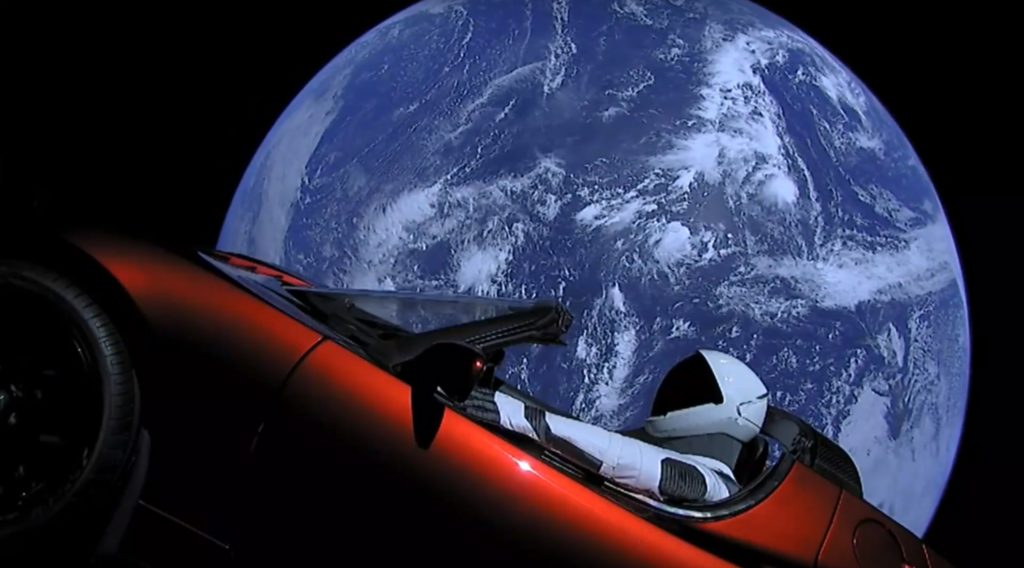
Today, Tesla is the world’s most valuable automaker, with a market capitalization of roughly $1.54 trillion. The Model Y has become the best-selling car in the world by volume for three consecutive years, a scenario that would have sounded insane in 2018. Tesla has also pushed autonomy to a point where its vehicles can navigate complex real-world environments using vision alone.
And then there is Optimus. What began as a literal man in a suit has evolved into a humanoid robot program that Musk now describes as potential Von Neumann machines: systems capable of building civilizations beyond Earth. Whether that vision takes decades or less, one thing is evident: Tesla is no longer just a car company. It is positioning itself at the intersection of AI, robotics, and manufacturing.
SpaceX’s trajectory has been just as dramatic.
The Falcon 9 has become the undisputed workhorse of the global launch industry, having completed more than 600 missions to date. Of those, SpaceX has successfully landed a Falcon booster more than 560 times. The Falcon 9 flies more often than all other active launch vehicles combined, routinely lifting off multiple times per week.
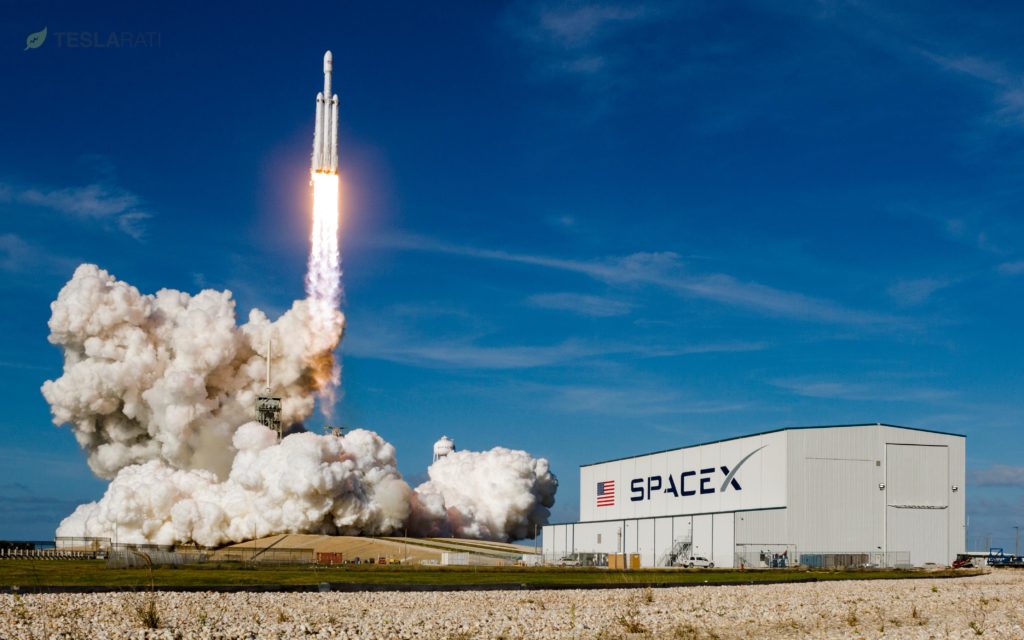
Falcon 9 has ferried astronauts to and from the International Space Station via Crew Dragon, restored U.S. human spaceflight capability, and even stepped in to safely return NASA astronauts Butch Wilmore and Suni Williams when circumstances demanded it.
Starlink, once a controversial idea, now dominates the satellite communications industry, providing broadband connectivity across the globe and reshaping how space-based networks are deployed. SpaceX itself, following its merger with xAI, is now valued at roughly $1.25 trillion and is widely expected to pursue what could become the largest IPO in history.
And then there is Starship, Elon Musk’s fully reusable launch system designed not just to reach orbit, but to make humans multiplanetary. In 2018, the idea was still aspirational. Today, it is under active development, flight-tested in public view, and central to NASA’s future lunar plans.
In hindsight, Falcon Heavy’s maiden flight with Elon Musk’s personal Tesla Roadster was never really about a car in space. It was a signal that SpaceX and Tesla were willing to think bigger, move faster, and accept risks others wouldn’t.
The Roadster is still out there, orbiting the Sun. Seven years later, the question is no longer “What if this works?” It’s “How far does this go?”
Energy
Tesla launches Cybertruck vehicle-to-grid program in Texas
The initiative was announced by the official Tesla Energy account on social media platform X.
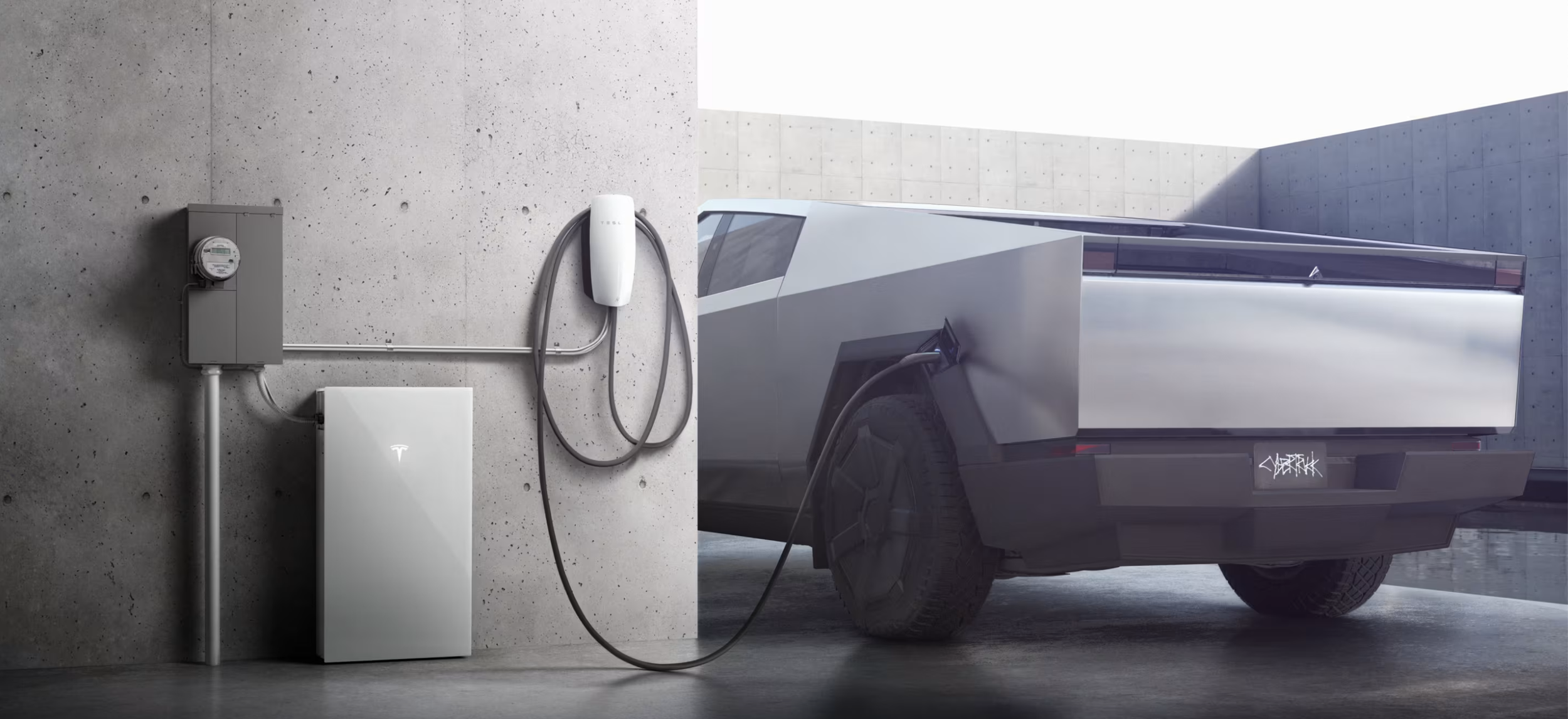
Tesla has launched a vehicle-to-grid (V2G) program in Texas, allowing eligible Cybertruck owners to send energy back to the grid during high-demand events and receive compensation on their utility bills.
The initiative, dubbed Powershare Grid Support, was announced by the official Tesla Energy account on social media platform X.
Texas’ Cybertruck V2G program
In its post on X, Tesla Energy confirmed that vehicle-to-grid functionality is “coming soon,” starting with select Texas markets. Under the new Powershare Grid Support program, owners of the Cybertruck equipped with Powershare home backup hardware can opt in through the Tesla app and participate in short-notice grid stress events.
During these events, the Cybertruck automatically discharges excess energy back to the grid, supporting local utilities such as CenterPoint Energy and Oncor. In return, participants receive compensation in the form of bill credits. Tesla noted that the program is currently invitation-only as part of an early adopter rollout.
The launch builds on the Cybertruck’s existing Powershare capability, which allows the vehicle to provide up to 11.5 kW of power for home backup. Tesla added that the program is expected to expand to California next, with eligibility tied to utilities such as PG&E, SCE, and SDG&E.
Powershare Grid Support
To participate in Texas, Cybertruck owners must live in areas served by CenterPoint Energy or Oncor, have Powershare equipment installed, enroll in the Tesla Electric Drive plan, and opt in through the Tesla app. Once enrolled, vehicles would be able to contribute power during high-demand events, helping stabilize the grid.
Tesla noted that events may occur with little notice, so participants are encouraged to keep their Cybertrucks plugged in when at home and to manage their discharge limits based on personal needs. Compensation varies depending on the electricity plan, similar to how Powerwall owners in some regions have earned substantial credits by participating in Virtual Power Plant (VPP) programs.
News
Samsung nears Tesla AI chip ramp with early approval at TX factory
This marks a key step towards the tech giant’s production of Tesla’s next-generation AI5 chips in the United States.

Samsung has received temporary approval to begin limited operations at its semiconductor plant in Taylor, Texas.
This marks a key step towards the tech giant’s production of Tesla’s next-generation AI5 chips in the United States.
Samsung clears early operations hurdle
As noted in a report from Korea JoongAng Daily, Samsung Electronics has secured temporary certificates of occupancy (TCOs) for a portion of its semiconductor facility in Taylor. This should allow the facility to start operations ahead of full completion later this year.
City officials confirmed that approximately 88,000 square feet of Samsung’s Fab 1 building has received temporary approval, with additional areas expected to follow. The overall timeline for permitting the remaining sections has not yet been finalized.
Samsung’s Taylor facility is expected to manufacture Tesla’s AI5 chips once mass production begins in the second half of the year. The facility is also expected to produce Tesla’s upcoming AI6 chips.
Tesla CEO Elon Musk recently stated that the design for AI5 is nearly complete, and the development of AI6 is already underway. Musk has previously outlined an aggressive roadmap targeting nine-month design cycles for successive generations of its AI chips.
Samsung’s U.S. expansion
Construction at the Taylor site remains on schedule. Reports indicate Samsung plans to begin testing extreme ultraviolet (EUV) lithography equipment next month, a critical step for producing advanced 2-nanometer semiconductors.
Samsung is expected to complete 6 million square feet of floor space at the site by the end of this year, with an additional 1 million square feet planned by 2028. The full campus spans more than 1,200 acres.
Beyond Tesla, Samsung Foundry is also pursuing additional U.S. customers as demand for AI and high-performance computing chips accelerates. Company executives have stated that Samsung is looking to achieve more than 130% growth in 2-nanometer chip orders this year.
One of Samsung’s biggest rivals, TSMC, is also looking to expand its footprint in the United States, with reports suggesting that the company is considering expanding its Arizona facility to as many as 11 total plants. TSMC is also expected to produce Tesla’s AI5 chips.








